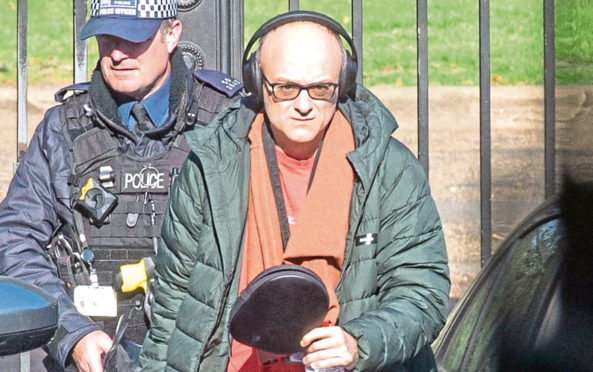
Prime Minister Boris Johnson is expected to return to work tomorrow amid concern his scientific advice is being influenced by party political considerations.
The membership of the Scientific Advisory Group for Emergencies (Sage) steering the government’s response to the pandemic had been kept secret.
But yesterday it emerged Mr Johnson’s chief political adviser, Dominic Cummings, attended meetings of the expert panel along with data scientist Ben Warner, who worked with Mr Cummings on the Vote Leave campaign.
Mr Johnson is recovering from coronavirus after a period in hospital, including almost four days in an intensive care unit (ICU) between April 6 and April 9.
Medical experts warned recovery could take one week for every day spent in ICU, but Mr Johnson is expected to step up duties this week. Mr Cummings and his wife are also recovering from Covid-19.
The Sage committee provides politicians with independent scientific advice at times of national crisis. The names of members are not published, aside from the chair – currently England’s chief scientific adviser Sir Patrick Vallance – but a leaked list of those attending meetings reveals the presence of Mr Cummings and Mr Warner.
The UK Government has led a four-nation response to the crisis but there is increasing concern Downing Street was too complacent and slow to react, losing crucial time to prepare the country. Initially, the government seemed reluctant to lockdown the country while ministers backed a policy of “herd immunity” but, within days, made a U-turn after a report suggested it could cost 250,000 deaths.
Dr Paul Hunter, professor of medicine at the University of East Anglia, who sits on a number of World Health Organisation (WHO) committees, said Mr Cummings’ involvement at Sage raised questions about the advice.
He said: “Whether or not he [Mr Cummings] did influence the outcomes we can’t know for certain. Therefore the validity of the advice coming out of the committee might be flawed.”
Scotland’s representative on Sage is Edinburgh University professor of Medicine Andrew Morris, who chairs the Scottish Government’s Covid-19 Advisory Group.
Twice-weekly Sage meetings are also attended by Scotland’s Acting Chief Medical Officer Dr Gregor Smith and Chief Scientific Adviser professor Sheila Rowan. A Scottish Government source told The Post all three are active participants in Sage meetings, and can ask questions and take part in discussions.
However, details of the meetings are not made public, which has prompted opposition politicians in Scotland to call for greater transparency. Scottish Labour leader Richard Leonard said: “In this time of national crisis, public trust and confidence are critical. That’s why transparency and accountability are of paramount importance and why the public must be kept fully informed of what is decided at high-level strategy meetings.”
Scottish Liberal Democrat health spokesman Alex Cole-Hamilton MSP said: “It’s not for politicians to tell the scientists how to operate but it might aid public understanding if these discussions were conducted in a more transparent manner. We should be treating the public like grown-ups.”
Scottish Greens MSP Alison Johnstone added: “We are being asked to make drastic changes to the way we live our lives and it is only right that the basis of the scientific advice and the identity of those giving it is publicised.”
No 10 said Mr Cummings attended Sage meetings “in order to understand better the scientific debates concerning this emergency and also to understand better the limits of how science and data can help government” but was not a member.
Nicola Sturgeon has so far been in lockstep with the UK Government but has been willing to diverge from Downing Street policy.On Thursday she set out proposals to ease the coronavirus lockdown, while Westminster has remained silent on its own exit strategy.
The First Minister warned the lifting of the lockdown would likely be phased, and measures could include some businesses reopening if they keep employees and customers two metres apart. Schools might partially reopen by allowing pupils to attend on alternate weeks.
But she warned that gathering of groups could be banned or restricted “for some time to come”. The move was at odds with the approach of UK Government ministers, who have refused to discuss their plans for easing the lockdown.

Enjoy the convenience of having The Sunday Post delivered as a digital ePaper straight to your smartphone, tablet or computer.
Subscribe for only £5.49 a month and enjoy all the benefits of the printed paper as a digital replica.
Subscribe © Pippa Fowles/10 Downing Street/Crown Copyright/PA Wire
© Pippa Fowles/10 Downing Street/Crown Copyright/PA Wire